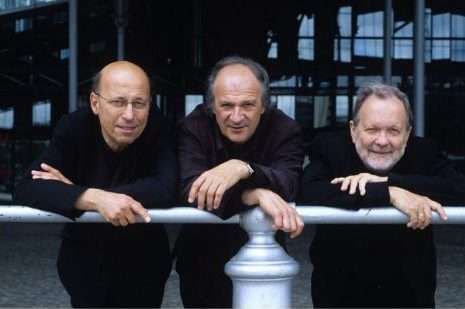|
Back
Chamber music ideally performed Toronto
Koerner Hall
07/16/2013 -
Gabriel Fauré: Piano Trio in D Minor, Op. 120
Maurice Ravel: Trio for Piano, Violin and Cello
Sergei Rachmaninoff: Trio élégiaque in D Minor, Op. 9
Jean-Claude Pennetier (piano), Régis Pasquier (violin), Roland Pidoux (cello)

R. Pidoux, R. Pasquier, J.-C. Pennetier (© Guy Vivien)
What is the French word for “beguiling”? Ah - it’s séduisant. If the Pennetier Pasquier Pidoux Trio decided to adopt a shorter name, Trio Séduisant would have to be it.
They gave a marvelously engaging performance for the opening concert of the eighth Toronto Summer Music Festival for a rapt near-capacity audience at Koerner Hall. The program was played in reverse order of composition, starting with Gabriel Fauré’s Piano Trio in D Minor, composed in 1923, the year before the composer’s death. Fauré had long since devised his signature style, that of a chaste ardour with flashes of reticent anguish. A ripple of applause followed the two first movements - this is usually a no-no in classical concerts, but much of the audience seemed genuinely surprised to be so taken up by music not designed to seize one by the scruff of the neck.
This was followed by Maurice Ravel’s only piano trio, composed in 1914 just as war was breaking out. The first movement is characterized by contrasting moments of drama and stasis. The second movement is based on a Malayan form (the pantun) in which two contrasting musical ideas are expressed together. Its exuberant swoops lead to an abrupt ending. The third movement is a thoughtful passacaglia which leads some to think it foreshadows the oncoming war. However, the lively finale (Animé) contradicts such an interpretation. As with the Fauré, the cogent, masterfully worked-out music was given an eloquent performance.
The second half of the program took us back to 1893 in St. Petersburg where the 20-year-old Sergei Rachmaninoff composed his deeply heartfelt memorial to the recently-deceased Tchaikovsky. His Elegiac Trio turns out to be quite the challenge, clocking in at almost an hour in length. Compared with the hyper-rich Fauré and Ravel works, the opening movement seems thematically meagre, although it certainly achieves its elegiac goal. At certain points the music is marshaled in a resolute manner, echoing so many Tchaikovsky works. As in the two French pieces, the trio lavished great care on the work, bringing out every contrast and nuance. This was especially rewarding in the second movement (marked Quasi variazione) which is a bit like hearing five slow movements strung together. The young (although already prize-winning) composer didn’t seem to know when to stop (and, in fact, later in life arranged two shorter versions of the piece).
Despite the length of the formal program, we were treated to an encore: the lively finale of Beethoven’s Piano Trio No. 3 in C minor.
The concert launched the 15-day summer music festival which this year has a focus on La Belle Epoque. It features no less than 60 events, some free, some pay-what-you-can, and some (such as this one) formally ticketed, all in fine venues in the University-Yorkville section of the city.
Michael Johnson
|